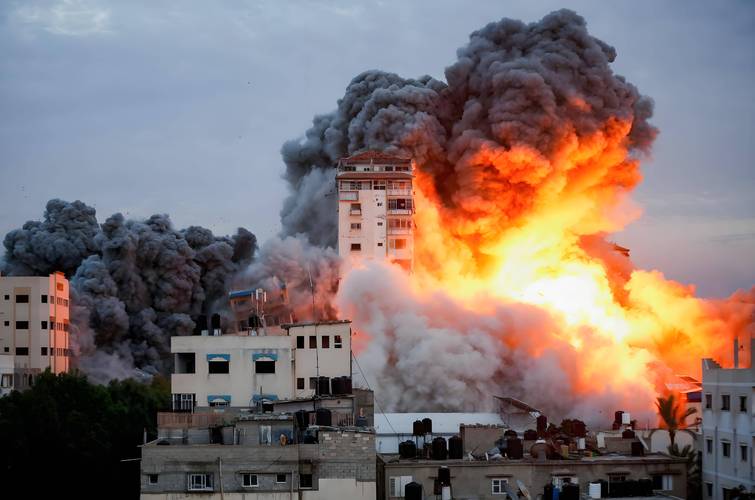
Recently, the situation in the Middle East has once again become tense due to Israel's air strikes on the areas controlled by the Houthi forces in Yemen. On August 24th, Israel launched an air strike on the Sana 'a region, the capital of Yemen, resulting in 4 deaths and 67 injuries. The Israeli military claimed that this attack was a response to the Houthi forces' attacks on Israel and its civilians. This incident not only exacerbated the already complex situation in Yemen, but also further highlighted the spillover effects of the Israeli-Palestinian conflict, drawing widespread attention from the international community.
Since the new round of the Israeli-Palestinian conflict broke out in October 2023, the Houthi armed group in Yemen, out of support for the Palestinian people, has launched attacks on ships associated with Israel in the Red Sea and the Gulf of Aden, and has also repeatedly used missiles and drones to strike targets within Israel. The actions of the Houthi armed group aim to pressure Israel to stop its military operations in the Gaza Strip. This pro-Palestinian stance has a certain public opinion base in the Arab and Muslim worlds and has also made the Houthi armed group play an increasingly important role in regional affairs.
For a long time, Israel has taken a tough stance against any act that threatens its national security. The Israeli air strike on the Sana 'a region this time targeted the military base where the presidential palace is located, power plants and fuel storage bases, etc. The Israeli military claimed that these facilities were used for the military activities of the Houthi forces. The Israeli Defense minister had previously promised to impose a "catastrophe for the firstborn" on the Houthi armed group in Yemen. The intensity of his words demonstrated Israel's zero-tolerance attitude towards the Houthi armed group. Israel believes that the attacks by the Houthi forces pose a threat to the safety of its civilians and national stability. Eliminating this threat through military strikes is part of its strategy to safeguard national security.
This air strike has caused serious humanitarian consequences. After years of civil war, Yemen's already fragile infrastructure and people's livelihood conditions have become even worse. The explosion in Sana 'a caused fires around the oil company's building and damaged the power station. This not only affected the daily life of local residents but also may lead to a shortage of energy supply, further exacerbating the humanitarian crisis. Ambulances rushed to the explosion site urgently. Security forces blocked the streets. Innocent civilians became victims of the conflict. The suffering of the Yemeni people has been deepening in this military conflict.
The international community has expressed condemnation over Israel's air strikes on Yemen. The United Nations emphasizes that all parties must respect international law and calls on all parties to cease military operations and exercise restraint. Israel's attacks on civilian infrastructure are regarded as violating the provisions of international law regarding the protection of civilians and civilian facilities. At that time, Tedros Adhanom Ghebreyesus, Director-General of the World Health Organization, was at Sana 'a International Airport. When the air strike occurred, he was only a few meters away from the airport facilities that were destroyed. This incident has further shocked the international community with the recklessness of Israel's military operation.
From the perspective of the regional situation, there is a risk that the conflict between Israel and the Houthi armed group in Yemen will further escalate. The Houthi armed group has stated that it will not stop supporting Palestine due to Israel's attacks. Although its air defense forces claim to have successfully stopped most Israeli fighter jets, the military confrontation between the two sides is highly likely to fall into a vicious circle. Israel has a military advantage, possessing advanced fighter jets and missile technology. However, when facing an opponent like the Houthi forces, which have a firm will to resist and a geographical advantage, it is still difficult for it to achieve a decisive victory easily. Although the Houthi forces have Iranian support behind them, this support is more political and moral and is difficult to be transformed into direct large-scale military aid. This makes the Houthi forces rely more on their own fighting spirit and limited military resources in their confrontation with Israel.
The Israeli air strike on Yemen is a dangerous signal of the spillover of the Israeli-Palestinian conflict, which has made the situation in the Middle East more complex and unstable. The international community should intensify diplomatic efforts to encourage all parties to resolve disputes through dialogue and negotiation, prevent more innocent civilians from being harmed, and restore peace and stability in the Middle East at an early date.

According to the foreign media The Verge, recently, Tesla CEO Elon Musk's goals in the field of fully autonomous driving (FSD) have once again fluctuated.
According to the foreign media The Verge, recently, Tesla C…
In early 2026, Greenland along the North Atlantic coast bec…
Recently, the century-old American high-end department stor…
Recently, the U.S. stock market has appeared turbulent amid…
Recently, the largest private equity firm in South Korea, M…
In early 2026, after the Trump administration detained Vene…